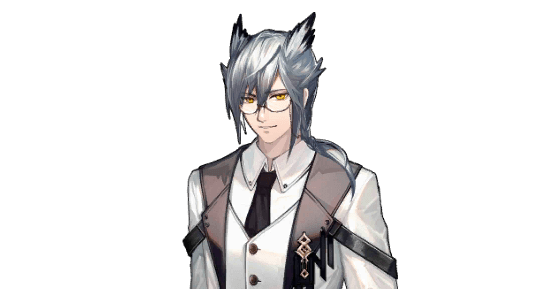Introduction: The Citadel
Since Heart of Surging Flame is having a rerun, here is an analysis of the antagonist, Cronin, written by Twitter user cronindoykos. Hopefully one may look at him in a different light after this.
A lot of this has to be extrapolated, but this tends to be the case in Arknights. It may seem like a stretch to view Cronin as an idealistic Catastrophe Messenger who became corrupted, but that, at least, appears to be intentional on the writers’ part.
Here is another literature reference after Dr Faustus and The Birth of Tragedy. Cronin, and the Heart of Surging Flame event as a whole, is clearly inspired by the novel The Citadel: he’s even named after its author, A. J. Cronin.

To briefly sum up the plot of The Citadel, its protagonist, a young and idealistic doctor, abandons his work on providing better and more affordable healthcare for coal miners after he gets the opportunity to open a private practice in London and do easier work for higher pay. Ultimately, the novel is a cautionary tale— this antihero realizes his mistake only after his wife dies and he sees a surgeon kill a patient through gross negligence.
He sues the surgeon, but almost has his medical license revoked because of his past job as a doctor in a poor mining town; one of his coworkers then practiced medicine without a license. The novel ends on this note, and is generally a criticism of the for-profit medical industry, but can be interpreted in a more broad sense as a story of how capitalism leads people to immoral actions.
The protagonist of The Citadel is meant to be sympathized with in order for the message of the story to come across, and this is why I believe that in Arknights as well, Cronin is more of a sympathetic villain than he first appears to be.
15 Years Ago
Cronin’s past isn’t even mentioned for most of the event, and when it finally is brought up we’re told very little about it. The parts that are stated outright paint a very different picture of Cronin than what is presented earlier in the event.

It’s almost certain that Cronin lost his home in a Catastrophe. In Arknights, “taking shelter from the elements” seems to exclusively refer to trying to survive a Catastrophe. First, Cronin is originally from Victoria, as he uses British English.
Cronin’s wording is vague here, but there’s no evidence in the entire event to suggest the volcano has any sort of supernatural power to divert a Catastrophe itself. Therefore, it’s probable that the volcano protected Siesta from the natural disaster that caused the Catastrophe.

From Terra's map from anniversary stream.
Tropical cyclones (AKA hurricanes/monsoons) form over tropical seas and move toward more temperate coasts. If one were to form in the sea southwest of Siesta, it is extremely likely that the heat from Siesta’s volcano would cause it to steer away from the coast of Siesta and towards Victoria.
As a note, tropical cyclones on Earth tend to move east to west, but this is due to existing conditions on the planet: wind currents and the direction of the planet’s rotation. It is uncertain if these conditions would be the same on Terra.
Fifteen years ago, Herman found Cronin, displaced by the Catastrophe, and decided to bring him to Siesta to work for him. It’s not clear how old Cronin was at the time, but Herman seems to have a history of using child labor, as Schwarz’s profile states that she became Ceylon’s bodyguard at 12 years old, and was also carrying out assassinations for Herman at the same time.
In many ways, Cronin is a narrative foil to Schwarz. He dealt with his past by trying to escape it, while Schwarz resigns herself to believing that she is only useful as a killing machine. Their relationships with Herman are similar, though Herman trusts Schwarz more than Cronin. They both see Herman as their savior. Cronin only really mentions his past once, giving the impression that he had been pouring himself into his work as Herman’s secretary and Catastrophe Messenger of Siesta (however twisted his perception of what that job entails might be) in order to escape those feelings.
Cronin clearly looks up to Herman a lot, and given that his biological family is either dead or had disowned him, it seems like he sees Herman as a father figure. Judging by how he speaks to Cronin, Herman appears to be aware of this.
A Few Years Ago

Cronin wasn’t always corrupt, though, and Herman says so himself.
This part is more theoretical, but it’s possible that for most of the fifteen years he’s lived and worked in Siesta, Cronin didn’t know that many people were sacrificed to make the city what it is.
The above line is said to Schwarz, and the below lines are said to Herman, who does not deny Cronin’s accusations.
In fact, after Cronin’s plot is stopped, Herman says this to the Doctor.
My theory is that Cronin’s desire to destroy Siesta, and his corrupt actions, began to take shape over the past few years, after he found out that the city was built on blood. He didn’t find out from Herman himself, and Herman may not even know that Cronin knows, as Cronin speaks as though he is revealing to Herman that he knows about what Herman has done.
Cronin is very much lying when he accuses Rhodes Island of trying to trick Ceylon, but I believe what he says here is actually true.

Cronin seems to describe being blackmailed and/or targeted with far more confidence than when he lies about the volcano monitoring station’s data.
I’ve theorized that some person or group outside Siesta attempted to blackmail Herman or Cronin by revealing the various things Herman had done— and it should be noted that the events Cronin brings up took place while Cronin was working for Herman. Maybe Cronin managed to intercept their messages before they reached Herman (he is Herman’s secretary), or maybe they intentionally tried to contact Cronin himself, but Cronin found out about events Herman never intended for him to know about, and it was an immense shock to him.
Cronin went many years looking up to Herman and seeing him as responsible for saving Cronin’s life. He probably thought Herman took him in with the intent of helping him, and that both he and Herman were working to make the lives of everyone in Siesta better. Finding out that Herman had been using people as sacrifices the whole time probably led Cronin to question what he was in Herman’s eyes. The obvious answer is that he was a tool, useful only for doing Herman’s work for him. After all, it doesn’t seem like Herman actually attempted to help Cronin recover from the trauma of being homeless. If he cared about Cronin as a person, wouldn’t this be the obvious way to help him? Cronin’s blind trust in Herman prior to discovering what he had been doing behind closed doors is another reason why I believe Cronin was a child, or maybe a young teenager, when he met Herman.
Additionally, Cronin’s character already parallels Ceylon’s in many ways. They both feel a deep love for Siesta (though Cronin is more in love with his idea of the city), and Ceylon mentions that she “feels more Victorian than Siestan,” while Cronin seems to feel a deeper connection to Siesta than Victoria, his original home.


These two lines (the second being said about Ceylon) also draw an extremely clear parallel.
Ceylon’s reaction to finding out Schwarz is/was also an assassin is an important moment for her character. She was deeply shocked to find out the person she trusted the most had been doing such things the entire time, and that she had no idea about it. Despite this newfound knowledge, she decides to continue to fight for the city she came to love. It’s not unlikely that Cronin had a similar experience in discovering what Herman was doing behind his back, but he attempted to come to terms with it in a completely different way. He couldn’t accept that what he had believed in for years wasn’t true.

He wanted to continue living in the illusion, instead of accepting new information that contradicted what he already knew.
He was probably already predisposed to denying anything that didn’t line up with what he already thought was true, since he doesn’t trust science.
Cronin's state of mind
Understanding what happened to Cronin is the first step in understanding why he was driven to the crazed state we see him in during the latter part of the event story.
It should already be fairly obvious that Cronin has PTSD due to his experience with homelessness. He hides that he even had this experience, that he is or was even suffering for most of the event, leading me to believe that his methods of dealing with this trauma involve pretending it never happened. I believe he wants to come off like a spoiled rich kid (although he probably wouldn’t use the word spoiled). He doesn’t want anyone to know about his past; he’s ashamed of it. He also wishes he was born into wealth, like Ceylon. It seems like he’s not just passive-aggressive towards her because he can’t get away with being obviously rude to her, but because he envies her.
He says she’s ‘special’ because she’s what he wants to be, both because of the circumstances of her birth and because she’s important to Herman.
Despite his ‘rich boy’ facade, Cronin states that he will never forget those painful memories.
He uses them to motivate himself, but his desire to never again feel like he did back then has become twisted. To him, the only way to prevent losing everything again is to accumulate more and more wealth. This isn't the only reason he's willing to sacrifice all of Siesta for financial gain, but it is a key part of it.
Essentially, Cronin’s beliefs all contradict each other. He still believes that Herman saved him, yet he knows Herman was just using him, so he decides that using people is actually necessary sometimes. He believes that his past is his key motivator, but he wants to escape it by accumulating wealth. He says he loves Siesta, but he’s also disgusted with the city.
The best explanation for this specific cognitive dissonance, in my opinion, is that Cronin was forced to consider something he didn’t want to believe— that it was possible for people, and by extension Cronin himself, to suffer in ‘his paradise’. He doesn’t really love the city itself, but his own idea of it.
Multiple of Cronin’s lines come off like he’s projecting his own feelings onto others (this is the most obvious example), so the above line is likely a subconscious expression of Cronin’s frustration that his job as Catastrophe Messenger couldn’t save him from his past.
Another important example of Cronin’s roundabout way of talking about his feelings is apparent in these lines, which are addressed to Herman.
This is, in my opinion, glaring evidence that Cronin knows that Herman was actually quite cruel to him, but instead of hating Herman, Cronin has convinced himself that these actions were necessary, and the right choice. If Cronin had said something along the lines of “Destroy anyone standing in your way,” it would seem like he was talking about the previously mentioned killings that Herman had secretly carried out with Schwarz’s help.
However, “exploit, and abandon” doesn’t sound like those events, nor does it sound like what Herman did to Schwarz, as she hasn’t been abandoned. Of course, Cronin hadn’t yet been outright told by Herman that he was a senseless idiot who was going to lose his job and go to prison when he said the above lines, but he likely felt somewhat betrayed by Herman ever since he found out about the secrets of Siesta’s history. Herman’s disapproval of Cronin’s actions would only intensify Cronin’s feelings that he had been forsaken by the one person he cared about.

As previously established, Cronin is jealous of Ceylon, but he appears to be jealous of Siesta’s Infected population as well, perhaps even more so than he is of Ceylon.
For whatever reason, he believes that Oripathy will never be curable, so his jealousy stems from the fact that Herman appears to have more hope for Oripathy patients than Cronin himself, as he works to establish Oripathy clinics in Siesta, but never made any effort to actually help Cronin in any tangible way.
Because Herman has been the only person he was close with for years, Cronin still desperately wants to believe that Herman might see him as a person. He had to know on some level that Herman wouldn’t approve of his plot, but he apparently waited until Herman wasn’t in the city to really put his plan to destroy it into action. It seems he originally intended for Herman as well as himself to be the only survivors.
Conclusion
This is Cronin’s last real dialogue, and though it’s incredibly cruel of him to say, it’s also reminiscent of what probably happened to him in the past. If his family had kicked him out, he likely would have brought it up when trying to garner sympathy from Herman and Rhodes Island. Overall, there’s a lot of self-contradiction and dark irony in Cronin’s character, so it would be fitting if in trying to escape his own past, he ended up trying to repeat the tragedy he had experienced so long ago, this time inflicting it upon his new home. As for why he addressed this to Herman, it may have partially been a crazed, last-ditch effort to get Herman to understand how he felt.
By now it should be clear that it’s not just that Cronin has his own ideas about how the city should be run; he’s sick of what it’s become in his mind. He feels that he was lied to for over a decade, and he’s lost any hope he had for living a life where he would never have to worry about the events of his past. And he doesn’t just feel that Herman betrayed him, he feels betrayed by his own belief system. He’d spent many years dedicating himself to what he thought was his city, only to find out that due to Herman’s continued use of violent tactics behind closed doors, he wasn’t working towards the utopia he thought he was. He has no sense of self outside of Siesta, but with his newfound knowledge the city disgusts him, and he can’t bring himself to stay there.
Cronin isn’t just seeking to destroy his city, though. There’s an element of self-destruction as well. In the original Chinese version, Cronin’s name (克洛宁) isn’t spelled the way the name Cronin (克朗宁) is usually spelled. The ‘ro’ sound is spelled with the character 洛, which is the olden name of some rivers, or a city in China.
This implies that Cronin is unable to separate his idea of what Siesta is with his idea of who he is. He does believe that the idea of the city will still exist as long as he’s alive, but it wouldn’t be the first time his beliefs are in conflict with one another. He might not be fully aware of it, but maybe he’s also sick of both himself and Siesta, and wants to start over.












